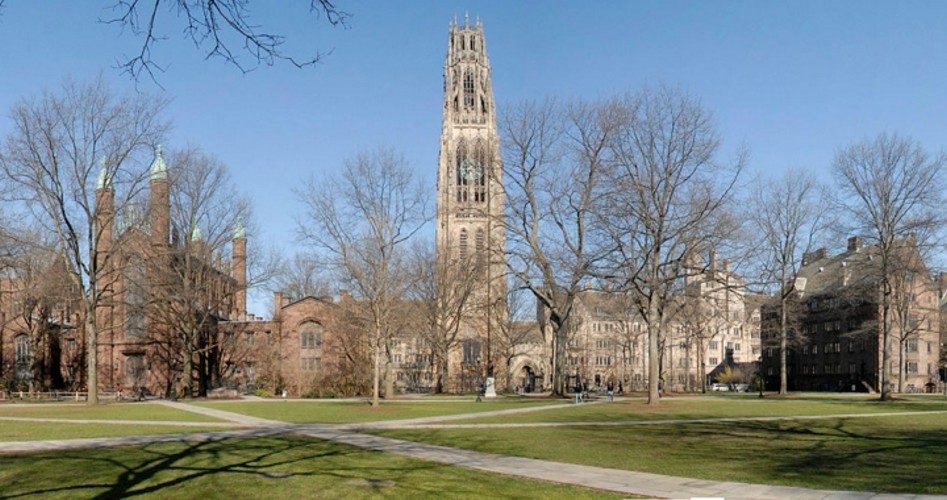
In a remarkable example of unrestrained infantile anger, a Yale student rushed to the front of a lecture hall last Friday where a conference on free speech was being held, disrupted the meeting, failed to end his shenanigans when other more mature students called for him to sit down, and then challenged a police officer who asked him to leave, shouting, “You’re going to have to carry me out!” The officer happily obliged.
Police at a free speech conference? At Yale, the home of free speech and the Woodward Document of 1975 that has been adopted by Yale as official policy for 40 years?
Apparently the exercise of free speech at Yale encompasses only free speech of which radicals approve.
Hundreds of student protesters gathered outside the hall where the Fifth Annual Conference on Free Speech was being presented by the William F. Buckley, Jr. Program. The title this year was “The Future of Free Speech: Threats in Higher Education and Beyond.” The presenters — 14 worthies from across the political spectrum — and the audience on Friday got an instant preview of just what that future looked like.
The conference came at a bad time. Three days before Halloween, Yale faculty sent out an e-mail to every student warning them to be “sensitive” when donning their costumes, so that they wouldn’t offend: “Halloween costumes … might offend or degrade others … costumes such as feathered headdresses, turbans, “war paint,” and blackface.” These would be, said the e-mail, examples of inappropriate “cultural appropriation and/or misrepresentation.”
This was just simply too much for one member of the faculty, who fired off an e-mail in response: “Is there no room anymore for a child or young person to be a little obnoxious … a little bit inappropriate or provocative or, yes, offensive?” She added, “American universities were once a safe space not only for maturation but also for a certain regressive … experience; increasingly, it seems, they have become places of censure and prohibition.”
The e-mail from professor Erika Christakis caught the attention of immature students with too much time on their hands and an itch to raise a ruckus. Several hundred of them stormed the conference center and, unable to get in, they waited for the conference presenters to exit. Then, they pounced, flinging unmentionable obscenities like Molotov cocktails and launching spittle in their protest.
Zach Young, president of the Buckley Program and one of the apparently few Yale students with a modicum of good sense, wrote in the Yale Daily News following the infantile exhibit of outrage:
Protestors lined up outside the lecture hall. Some demanded that we immediately add speakers of their choosing to the conference. Others tried to get into the lecture hall [but] police stood guard at the doors to ensure our symposium could go on as planned.
Young then tried, unsuccessfully, to explain the purpose of the Constitution, but did succeed in defending its First Amendment. First, his failed understanding of the Constitution: “The Constitution is an aspirational document, which states principles and a vision for our society.”
This reflects the likely chance that Young has never read the full text of document which he was trying to defend. Nowhere in it is expressed any aspirations or visions. It was a contract between sovereign states ceding limited powers to their agent (the federal goverrnment), with limitations and restrictions explained and placed to make sure that that agent wouldn’t exceed its authority granted by that contract.
Nevertheless Young succeeded in defending the First Amendment right of every citizen to express his views even if they aren’t popular:
What good is the First Amendment when people are shamed for holding dissenting views? Those protesters … are creating a campus culture that is hostile to free express[ion] and the exchange of ideas. It is a culture in which students and faculty are afraid to voice their opinions. It is a culture of conformity, intimidation and silence…. What does it say when holding an event on free speech requires the presence of several Yale police officers?
What it shows is just how far many of the infantile angry protesters have strayed from the principles adopted 40 years ago in Yale’s Woodward Report as the university’s official policy. It says in part, “The paramount obligation of the university is to protect [students’] right to free expression.”
It also provides the answer to how to handle disrupters and protesters infringing on others’ rights to that expression: “This obligation can and should be enforced by appropriate formal sanctions.”
Nowhere is there any evidence that Yale is, or soon will be, instituting any of those “appropriate” forms of sanctions, such as expelling those who want to get their way and when they don’t, wind up pounding their fists on the floor in a tantrum.
A fair question to be asked, in light of those protesting free speech at a free speech conference at Yale: Just where is this world that they are preparing for, where there is no dissent, where there are no sanctions, where those with dissenting views are marginalized or sanctioned into silence? Just where is this “safe space?”
Image of Yale’s Old Campus
A graduate of an Ivy League school and a former investment advisor, Bob is a regular contributor to The New American magazine and blogs frequently at www.LightFromTheRight.com, primarily on economics and politics. He can be reached at [email protected].



